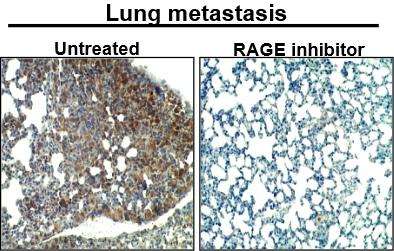Researchers identify receptor to slow breast cancer metastasis

In a research study published in the journal Oncogene, scientists from Sylvester Comprehensive Cancer Center at the University of Miami Miller School of Medicine showed that by therapeutically targeting the receptor for advanced glycation end-products (RAGE) in breast cancer cells, they decreased tumor growth, reduced tumor angiogenesis and recruitment of inflammatory cells, and dramatically decreased metastasis to the lung and the liver.
"RAGE is highly expressed in various cancers and is correlated with poorer outcome in breast and other cancers," said Barry I. Hudson, Ph.D., cancer researcher at Sylvester, assistant professor of medicine at the Miller School, and corresponding author of the study. "In this study, we tested the role of targeting RAGE by multiple approaches in the tumor and tumor microenvironment, to inhibit the metastatic process."
Over the past few years, Hudson and his team have found that blocking RAGE signaling may be an attractive therapeutic target for reducing tumorigenesis and metastasis. Their work has demonstrated that blocking RAGE signaling results in reducing tumor growth and metastasis. Furthermore, they have shown activation of RAGE signaling results in profound changes in cellular properties strongly associated with the metastatic process including increased cell migration and invasion, proliferation, and resistance to apoptosis.
"The results of the study demonstrate that RAGE drives tumor progression and metastasis through distinct tumor cell mechanisms, both intrinsic and extrinsic," said Hudson. "This may represent a novel and therapeutically viable approach for treating a variety of metastatic cancers, not just breast cancer."
"This is an extraordinary step in better understanding how and why breast cancer spreads," said Judy Salerno, M.D., M.S., president and CEO of Susan G. Komen, which provided a Career Catalyst Research Grant to Hudson for this research. "Dr. Hudson's work has the potential to save the lives of women and men battling metastatic disease, and we at Komen are proud to have helped launch his promising career in breast cancer research."

















